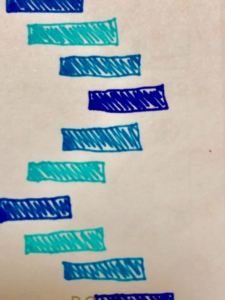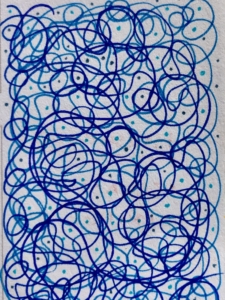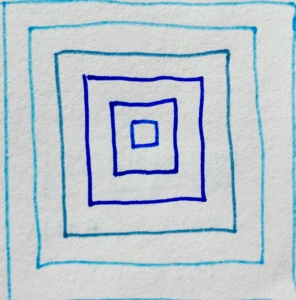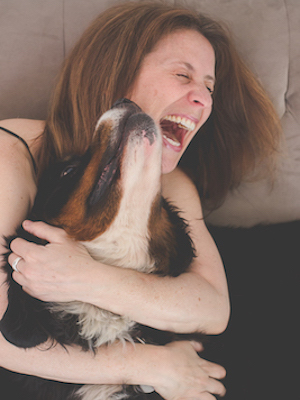Admissions: Part 1

I was 16. It was fall of my senior year, and I was applying to colleges. But I knew where I wanted to go. For most of my life, I’d lived down the street from my dream school, an ivy-covered university that loomed large in my consciousness. My father was affiliated with it, and it played a central role in my family’s life—we went there for plays, exhibits, sports events. I’d even dressed up on Halloween as the school’s star football player when I was a kid. I was sure this university was my destiny.
Despite my proximity to the campus, when I applied, I was assigned an alumni interview off campus with a man who had been some sort of university fancy-pants, possibly in the admissions office, although I can’t swear to that. He was retired, and conducting interviews in his apartment—a common practice for alums at the time.
I remember his living room as formal, and designed for discomfort. Hard, sharp angles. I sat on the edge of my straight-backed chair, posture as perfect as possible. I tried to interpret his reaction as he read my resume, which overflowed with plays and musicals, thanks to a public school system with a serious theater department—when we did Children of a Lesser God, we all learned sign language; when we did Anything Goes, we all learned to tap dance. Because of these opportunities, I was passionate about acting and loved discussing it.
So when he snuck in some questions about the kinds of warmups actors do before a rehearsal or performance—“Do you touch each other? Do you massage each other?”—it took me a second to realize he’d, uh, segued. I paused, thinking I was misunderstanding, or possibly being tested in some way that I wasn’t smart enough to get. I sidestepped, talking instead about vocal warmups, trying to impress him—distract him?—with my encyclopedic knowledge of exercises from Kristin Linklater’s book Freeing the Natural Voice. It worked.
Until the end, when I was leaving.
He stood behind me, holding up the coat I’d worn because I loved how grownup it made me feel. I reached back, putting my arms in the sleeves. His hands came to rest on my shoulders. Was he making a decision in that moment? Had I given him some clue that my subconscious was onto him? Then he slid his hands down over my chest. I froze. He took full advantage of my fear. He lingered. The front door couldn’t have been more than two feet away.

I don’t remember what happened next. This leaves open the possibility that I spun around and took him out with a perfect roundhouse kick to the face, but I’m pretty confident I’d remember that. Hopefully I made some move to extract myself, but who can say? I do remember what I was wearing: my favorite pencil skirt with the tiny houndstooth pattern; my favorite black turtleneck sweater. Both were tight, something I still think about despite the fact that I went to a fantastic female-forward college that sharpened my ideas about feminism and educated me about gender-based power dynamics. And the legal definition of sexual assault.
A few months after the interview, I got a letter from the university saying I’d been waitlisted. A few days after that, I came home from track practice and my mother handed me a phone message she’d taken from the man who’d interviewed me. The message said something like, “Call if you want to discuss what you can do to get off the waitlist.” He’d left his phone number.
I never used it. But I never told anyone about him, either.
Fear, embarrassment, concern that I’d invited his behavior, and a desire to never think about him again kept me silent. As awful as those feelings were, they were nothing compared to the shame I felt about participating in his debasement of my plans for the future. It was a well laid trap—an adult with the power to determine my path had invited me into a “safe” space and used my vulnerability against me—but I still hated myself for walking into it, and for freezing at the critical moment.
I buried the experience. For years, I didn’t give him a thought. Not until the Weinstein scandal broke and stories of abuse were everywhere. As the details of my interview resurfaced, I struggled with guilt about the girls who may have met with him after I did. I composed an email to the admissions director at the university, telling her what he’d done—the inappropriate questions, the groping, the phone message months later. I asked whether the university still allowed interviewers to meet prospective students in private places. The draft languished in my outbox as I tinkered and tinkered, unsatisfied with my words, my syntax, my tone—the retelling, so many years later, made the story feel both too big and too small. Finally, I asked a trusted friend to help, and after inputting her edits, I hit send without rereading.

Four days later, I received a kind and apologetic response, with a screenshot of the online guide for alumni interviewers. The screenshot featured two sentences and a text box. The first sentence read, “Please choose a neutral, comfortable, and convenient venue,” with a text box next to it titled “Venue Ideas,” and three bullet-pointed suggestions: “your local public library,” “the student’s high school,” “a small coffee shop.” The second sentence read, “Interviews are not permitted in either the interviewer’s home or the applicant’s home.”
Those italics—their italics—set my imagination on fire.
What if the man who’d “interviewed” me had a system? What if he’d leveraged his status at the university so he could meet with local girls at his apartment, recommend they be waitlisted, and then summon them back under the guise of helping them get in? What if he assaulted—to an even greater degree—the girls who went back for his help? What if those girls tried to report him but no one listened because it was easier and tidier to believe him?
It’s been almost two years since I emailed the admissions director. The questions raised by our exchange still take up an inordinate amount of my mental real estate. I’m going to attempt a reclamation of that space by searching for answers.
My plan is to talk to my parents, track down high school classmates who also applied to the university, and email the admissions director again. There are at least three reasons—probably more—why this plan may yield no results: 1) the man who interviewed me has almost surely died by now (I wish he’d had the good grace to do this before he started interviewing high school girls in his apartment); 2) all this happened before the digital age, and information about students who applied but weren’t admitted is probably long gone; and 3) while my plan is great in theory, I don’t actually want to execute it.
But I will, or I’ll try. I can make myself ask a few uncomfortable questions in the name of truth. I’ll let you know how it goes.
Louise Rozett is a YA author, a playwright, and a screenwriter—the order depends on the day. She’s the author of the Confessions series (Confessions of an Angry Girl, Confessions of an Almost-Girlfriend) published by HarlequinTEEN, and wrote a pilot based on the series which won best half-hour original script at the Austin Film Festival. Her play Break, about the effects of the 9/11 recovery effort on the recovery workers and their families, was a finalist for the Stanley Drama Award and was workshopped at New York Stage & Film. She is a graduate of Vassar College and the MFA acting program at The Theatre School at DePaul University. Visit Louiserozett.com for more.
Photo credit: Ericka Kreutz





